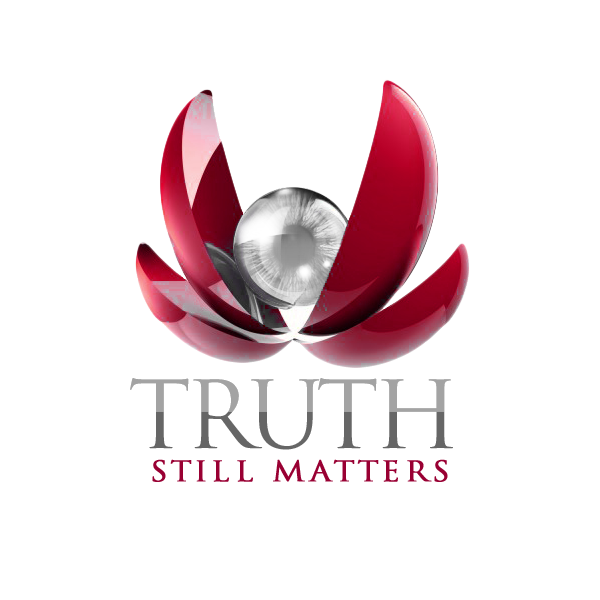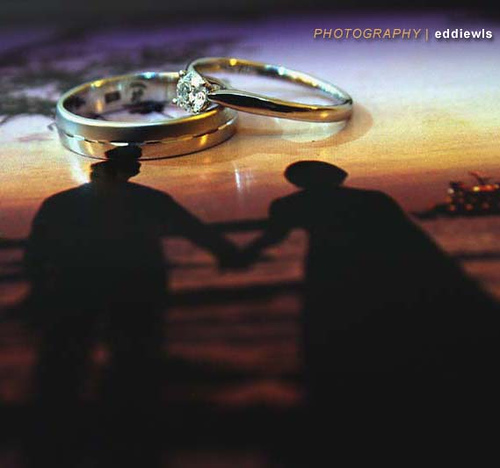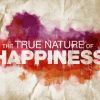Divine institution of marriage
 One way, which also has an intrinsic value, in which we might come to live and love in the Blessed Trinity is through a partner[1] in the covenant of marriage. “ ‘The intimate community of life and love which constitutes the married state has been established by the Creator and endowed by him with its own proper laws. . . . God himself is the author of marriage.’ The vocation to marriage is written in the very nature of man and woman as they came from the hand of the Creator”[2]. Genesis states, “Let us make man in our image, after our likeness; So God created man in his own image, in the image of God he created him; male and female he created them.” (1:26a, 27 emphasis added). This has been traditionally looked at as a reference to being free self-conscious and self-determining rational beings. After observing God’s inner life, new light is shed on being made in His image. We see that in our very nature we are made for each other to live in communion. It is only in communion through a “sincere gift of self”[3] to each other do male and female image the communal life-giving Godhead. “Indeed, it was in the first Adam, the first human beings, male and female, ‘that God himself constituted the essential structure of marriage between man and woman – the structure that we should expect to encounter in every marriage’.”[4]
One way, which also has an intrinsic value, in which we might come to live and love in the Blessed Trinity is through a partner[1] in the covenant of marriage. “ ‘The intimate community of life and love which constitutes the married state has been established by the Creator and endowed by him with its own proper laws. . . . God himself is the author of marriage.’ The vocation to marriage is written in the very nature of man and woman as they came from the hand of the Creator”[2]. Genesis states, “Let us make man in our image, after our likeness; So God created man in his own image, in the image of God he created him; male and female he created them.” (1:26a, 27 emphasis added). This has been traditionally looked at as a reference to being free self-conscious and self-determining rational beings. After observing God’s inner life, new light is shed on being made in His image. We see that in our very nature we are made for each other to live in communion. It is only in communion through a “sincere gift of self”[3] to each other do male and female image the communal life-giving Godhead. “Indeed, it was in the first Adam, the first human beings, male and female, ‘that God himself constituted the essential structure of marriage between man and woman – the structure that we should expect to encounter in every marriage’.”[4]
“The very meaning and value which marriage possesses of its own cannot be understood if we fail to start from the central reality of the love between man and woman…the deepest source of natural happiness in human life, the great, glorious love of which the Song of Solomon says: ‘ If a man shall give all the substance of his house for love, he shall despise it as nothing’.”[5] This love finds its expression and fulfillment in the marital act. Genesis states,
“Then the Lord God said, ‘It is not good that the man should be alone; I will make
him a helper fit for him…Then the man said, ‘This at last is bone of my bones and
flesh of my flesh; she shall be called Woman, because she was taken out of Man.’
Therefore a man leaves his father and his mother and cleaves to his wife and they
become one flesh.” (2:18,23-24)
 “Pope John Paul II says of this text: … ‘We read in fact, that “a man leaves his father and his mother and cleaves to his wife. If the man belongs by nature to his father and mother by virtue of procreation, he, on the other hand, cleaves by choice to his wife (and she to her husband).[6]The marital act is not merely a biological reality but a complete free donation of the person, body and soul, to their spouse for the sake of becoming one. “We could also apply to the conjugal act the admirable words of St. Ambrose in speaking of the kiss: ‘Those who kiss one another are not content with the donation of their lips, but want to breathe their very souls into each other’.”[7] “ ‘Cleaving’ (Gen 2:24) connotes a permanent attraction.”[8] Through this conjugal act the marital covenant is consummated once and renewed throughout the permanent life of the couple together.
“Pope John Paul II says of this text: … ‘We read in fact, that “a man leaves his father and his mother and cleaves to his wife. If the man belongs by nature to his father and mother by virtue of procreation, he, on the other hand, cleaves by choice to his wife (and she to her husband).[6]The marital act is not merely a biological reality but a complete free donation of the person, body and soul, to their spouse for the sake of becoming one. “We could also apply to the conjugal act the admirable words of St. Ambrose in speaking of the kiss: ‘Those who kiss one another are not content with the donation of their lips, but want to breathe their very souls into each other’.”[7] “ ‘Cleaving’ (Gen 2:24) connotes a permanent attraction.”[8] Through this conjugal act the marital covenant is consummated once and renewed throughout the permanent life of the couple together.
From this fidelity and unity, that can only exist in marriage due to its permanent nature, springs forth the potential of procreation. Genesis states, “And God blessed them, and God said to them, ‘Be fruitful and multiply, and fill the earth subdue it..’ ” (1:28). “By its very nature the institution of marriage and married love is ordered to the procreation and education of the offspring and it is in them that it finds its crowning glory.”[9] We are not to conclude from this that marriage exists exclusively for the rearing of children. Marriage has superabundant finality, which says that it has purpose in itself as well as serving the end.[10]
To be continued…
[1] Arnold, Johann Christoph, Purity: Sex Marriage & God, The Plough Publishing House, Farmington, PS, 1996, p.11
[2] CCC 1603; cf: GS 41
[3] Mulierus Dignitatem #7
[4] Lawler, Ronald O.F.M; Boyle, Joseph Jr.; May, William; Catholic Sexual Ethics, Our Sunday Visitor Publishing Division, Huntington, Indiana, 1998, p. 34
[5] Von Hildebrand, Dietrich, Love Marriage and the Catholic Conscience, Sophia Institute Press, Manchester, NH, 1969, p.15
[6] Lawler, Ronald O.F.M; Boyle, Joseph Jr.; May, William; Catholic Sexual Ethics, Our Sunday Visitor Publishing Division, Huntington, Indiana, 1998, p. 36;cf: Theology of the Body p. 50
[7] Von Hildebrand, Dietrich, Love Marriage and the Catholic Conscience, Sophia Institute Press, Manchester, NH, 1969, p.20
[8] Lawler, Ronald O.F.M; Boyle, Joseph Jr.; May, William; Catholic Sexual Ethics, Our Sunday Visitor Publishing Division, Huntington, Indiana, 1998, p. 35
[9] CCC 1652; cf: GS 48s1;50
[10] Von Hildebrand, Dietrich, Love Marriage and the Catholic Conscience, Sophia Institute Press, Manchester, NH, 1969, p.41







Follow Us!